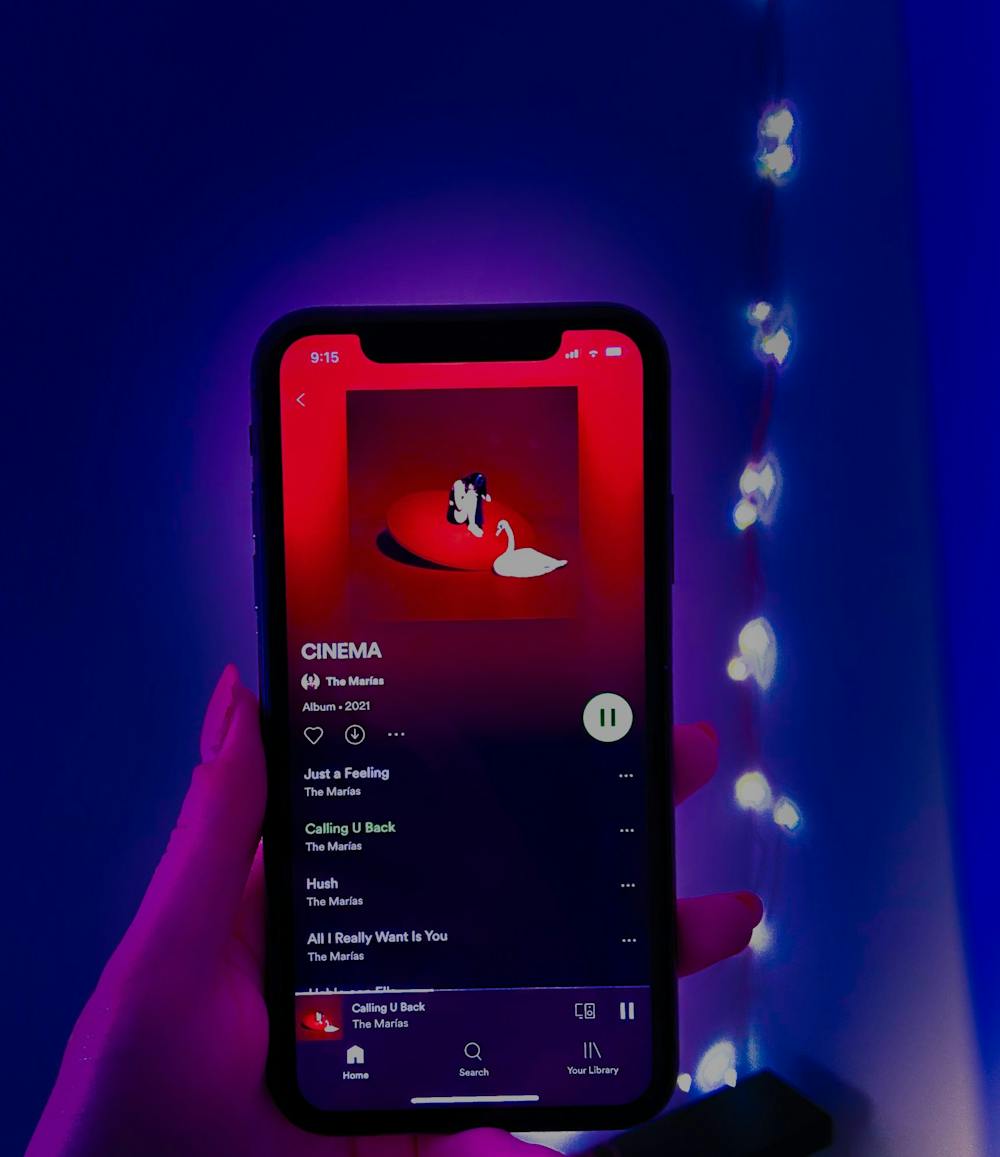Dreamy, heartfelt and longing — The Marías debut their first full album “CINEMA,” an ode to their love of film and the thrilling rush of inspiration. Made up of bilingual couple María and Josh Conway, The Marías continue to plunge deeper into the genre of indie pop. Their passion, drive and boldness are notable throughout the album and add a sense of depth to each individual track.
“Just a Feeling” starts the beginning of the album with a soothing, guitar-heavy melody that sings of Latin American influence, most likely furthered by María’s Puerto Rican background.
From there, a dog bark marks the swift transition into “Calling U Back”, the synth-laden second track of the album. Misery is here. On lead vocals, María refuses to be alone, asking her ex-partner to “tell me it's a song and not a break up.” She does not want to come to terms with the end of the relationship, continuing to sing “I'll see you in the morning when we make up.”
In “Hush,” María is not so pleading. The darker beat and emphasis on percussion stand ground to María’s demands for her past lover to stop acting so special and to “get your paws off my Dolce cologne.”
On “All I Really Want Is You,” The Marías examine their compassion and care. Repeating the same chorus in almost the entirety of the song, María dreams of “laying in the rain with you / middle of June” and “sleeping outside, the moon / tripping with you.” A serene melody and gentle guitar outline the song’s desire for a committed new love.
The instrumental “Hable con Ella” — meaning “talk to her” in Spanish — is next. Only 30 seconds long, the charming song brings out the vivacity of an old trumpet, reminiscent of soundtracks to 1940s Hollywood films.
Highlighting The Marías’ bilingual status, “Little by Little” incorporates English and Spanish verses to convey the incredible joy and light that being in love can bring. In Spanish, María sings “vamos a quedarnos en tu cielo, amor / juntos, enredados en tu habitación,” loosely translated as “let’s stay in your heaven, love / together, entangled in your room.” She continues in English, “I wanna make you feel alright / I wanna do it right this time.” Little by little, her adoration for her lover only grows.
“Heavy” is indie pop through and through, with an emphasis on electric guitar, a classic drum set, wavy synths and a surprise xylophone in the mix. Depression and isolation are at the forefront of the track, forcing María to put on a smile even though she sings “yeah, I just wanna be alone.”
“Un Millón” — meaning “one million” — explores the excitement and freedom of love in complete Spanish. María envisions an escape, asking her lover “vamos juntitos hacia Bayamón / luego a Luquillo pa' tomar el sol,'' loosely translated as “let's go together to Bayamón / then to Luquillo to sunbathe.” She wants to travel around the world with her partner, their souls now devoted to each other.
Visiting a sort of blend between shoegaze and quieter indie rock, “Spin Me Around” embraces loss of control in a relationship. The Marías are aware of their crazed situation, singing that “I know what you're thinking about / babe I'll let you spin me around.”
Revisiting the melancholy tone in “Heavy,” “The Mice Inside This Room” examines discomfort and a problematic tolerance of toxicity. Over surreal-sounding synths and a gnawing tension, The Marías go through the motions, remarking how they are “pushing my love aside” and “losing my appetite.” For María, it is time to let her lover go, which she repeats until the orchestral finish of the number.
Maybe that was a mistake, or so “To Say Hello” states. With vocals reminiscent of Billie Eilish, María cries, “I miss you / I messed up” and demands, “I belong in here.” In Spanish, María sings, “quédate conmigo que no quiero alejarme,” loosely translated to “stay with me, I don't want to get away.”
Unfortunately for The Marías, it is over. El fin. A tranquil, echoing acoustic guitar plays, giving intensity to María’s lament for her lost love. Heartbreak is near for María, as she cries “me la paso llorando / me la paso añorando/me la paso en ti,” loosely translated as “I spend my time crying / I miss it / I spend it on you”.
The final song of “CINEMA” is “Talk to Her,” cycling back to the themes of “Hable con Ella.” “Talk to Her” is about the human experience. It is about solitude, gritty realism and the hope that resides in humans, no matter the circumstance. María voices a poem over the sounds of piano and heavier percussion, giving the song a feel of a poetry slam, a performance. Most of all, “Talk to Her” concerns the presence of existentialism as it fights against human perseverance. Although The Marías sing “don't stop giving up,” they also relinquish their confidence with the lines “I don't know exactly where I'm supposed to be / it's a hollow thought that takes control of me.” However disconcerting the claim may be, it is a valid one to make — and serves as some interesting food for thought to finish off the album.
“CINEMA” is a one-of-a-kind journey into indie pop. The album is a series of juxtapositions — between light and loss, between traditional sounds and modern arrangements, between languages and between voices. A perfect collection of songs for a midnight drive, “CINEMA” tells the age-old story of love gone awry from the perspective of introspection. Though heartache may be a grim reality for many, a closer look at an individual’s own motivations and needs may prove that the grief is worth it.
At least, that is what The Marías seem to believe.







